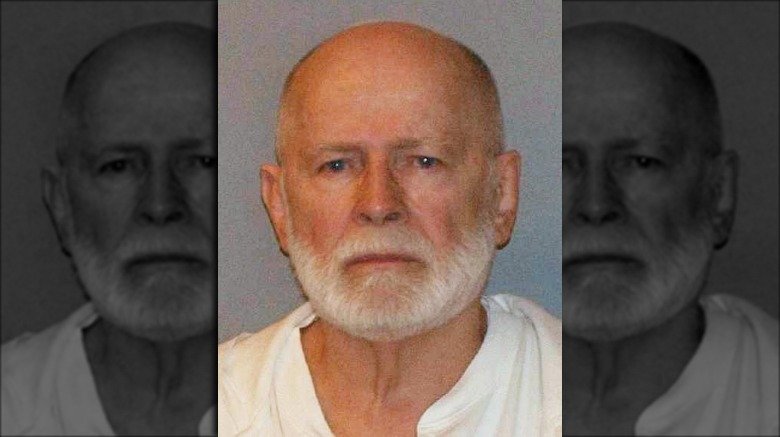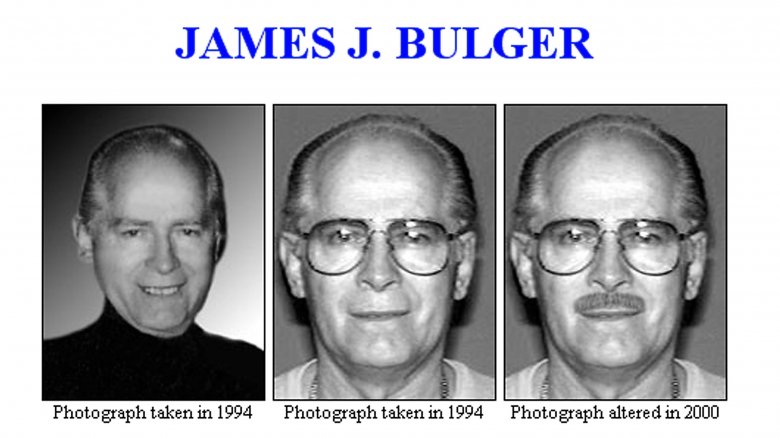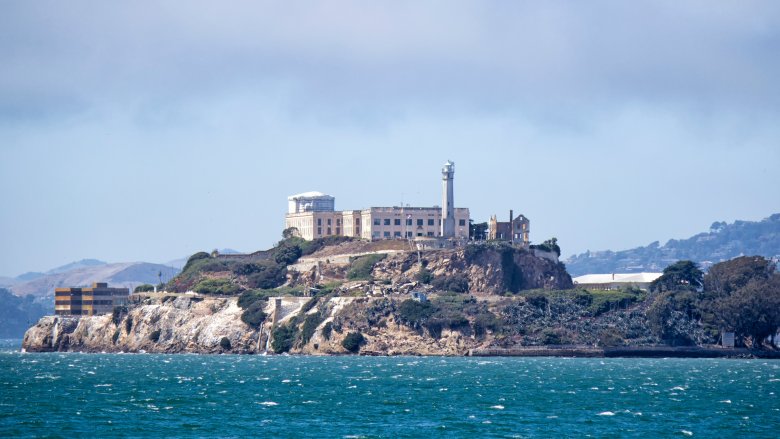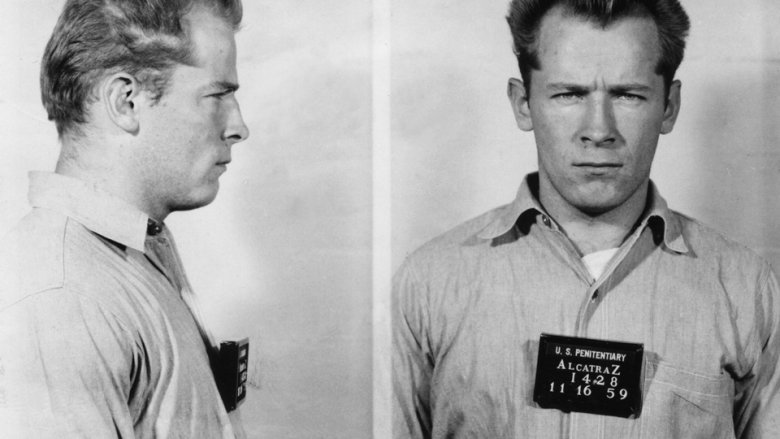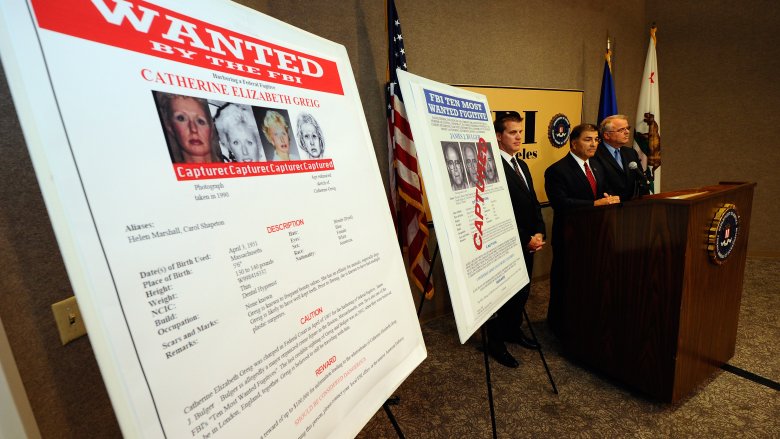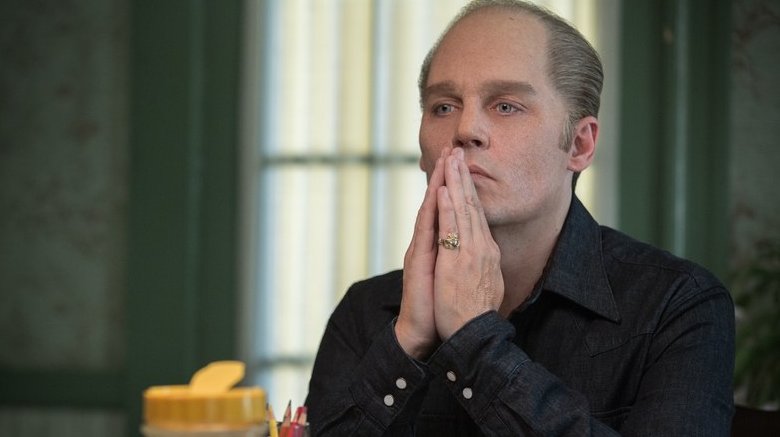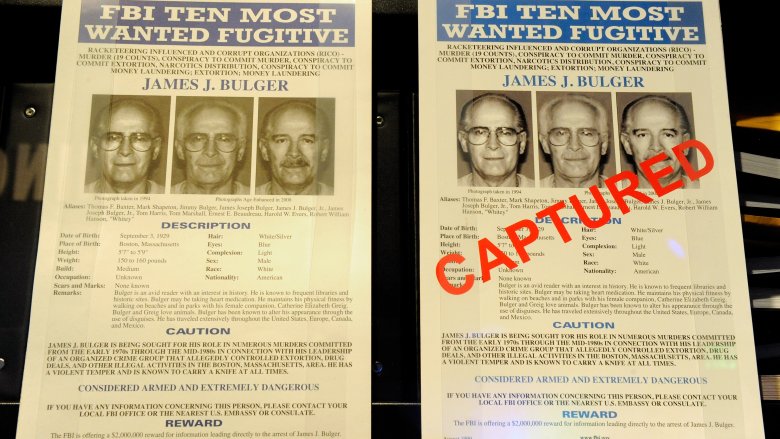The Untold Truth Of Whitey Bulger
When James "Whitey" Bulger was beaten to death in a high-security West Virginia facility on October 30, 2018, it was the end of his brutal, bloody, and sometimes just downright strange life as one of the East Coast's most notorious mob bosses. According to CNN, law enforcement was treating the incident as a homicide and soon had suspects within the mob.
Most people have heard his name, but might not be as familiar with who he actually was. In 2013, he was sentenced to two life terms for a whole host of crimes, including extortion, racketeering, and his involvement in 11 killings between 1973 and 1985. He wasn't just an ordinary mobster, though, and spent years both running the Irish mob in New England and acting as an FBI informant. According to CNBC, he went on the run in 1994 when his FBI handler warned him they had just put a reward out on him, and he spent the next 16 years evading law enforcement. His life ended not long after his freedom did, and it was a life as fascinating as it was brutal.
Opposing racial integration
Although CNBC notes he got the name "Whitey" because of his platinum blond hair, you could make a different connection with his past. Bulger grew up in a rough South Boston housing project, and Boston Globe reporters Kevin Cullen and Shelley Murphy covered him throughout his career. They say he was 16 the first time a drunk police officer shoved a gun in his mouth. That was in 1945.
Fast-forward a few decades and the highly segregated community was about to have change forced onto it. In 1974, a busing plan was implemented to integrate the Irish from South Boston and the black families from Roxbury. It was much more complicated than that, but at the heart of the anti-integration side was Bulger. He led protests, encouraging and sponsoring "militant violence" against organizations who supported the integration scheme.
The generation going through school at the time had the country's worst attendance and dropout rates, and countless kids ended up on the streets. Bulger ran those streets, recruiting kids to do his dirty work for him and building up his empire from the poorest of Boston's families. Michael Patrick MacDonald of WGBH News grew up in Bulger's Boston, lost siblings to the violence, and saw the area's desperate caught up in drugs, robberies, and hijackings, "most of which also lined Whitey's pockets."
The Whitey Bulger myth
When Bulger was finally sentenced in 2013 after decades of running his Boston-based gang, reporters found something strange. People who knew him talked about how he was always ready to lend a helping and, almost everyone knew someone who was good friends with him. Phillip Martin from WGBH found some people even called him Robin Hood, partly because of three key beliefs he'd been careful to nurture: he didn't kill women, he kept drugs out of the community, and he never, ever snitched.
But during the trial, the truth started to come out. That began with the murders of Deborah Hussey and Debra Davis, two women Bulger had insisted on killing himself. Then, a former South Boston cocaine dealer named John "Red" Shea stepped up to testify that Bulger was neck deep in the cocaine trade and made a fortune from dealing in the same neighborhoods everyone said he protected.
Then testimony came flooding in that at the same time Bulger was running the Winter Hill Gang, he was also acting as an FBI informant. One witness, Tommy Donahue, said, "To find out that he was an informant and ratting people out and killing people and getting away with it — it makes him look like the scum he is."
His complicated status as an informant
According to the New Yorker, Bulger started cooperating with the FBI in 1975. He was designated a "Top Echelon Informant," and they also say he was absolutely not worried about anyone finding out. He'd spent so much time cultivating his reputation that even if the truth hit the streets, he was confident no one would believe it.
He preferred to be called a "liason" or a "strategist," and the deal was that he would share information about his Italian rivals but not about his Irish brothers. And his information was incredibly valuable. It allowed the FBI to start chipping away at La Cosa Nostra, and guess who picked up the pieces?
His handler was John Connolly, and there was a complicated relationship there that resulted in the FBI covering up crimes they knew Bulger had committed in order to keep their top informant. Bulger plied his FBI contact with gifts (it's estimated Connolly got somewhere around a quarter of a million), and it wasn't until 1994 that others in the FBI started to take notice and decided Bulger's reign of terror just couldn't continue. Connolly tipped him off, and Bulger fled.
Nothing about his capture seems remotely plausible
Some people have boring lives. Some people have lives that sound like a movie script, and in Bulger's case, his 16 years on the run and ultimate capture sound like the most bizarre mob movie ever pitched.
Boston University says while Bulger was on the run, handler John Connolly was indicted for racketeering and tipping Bulger off. Bulger remained a free man for 16 years, and weirdly, he took the top spot on the FBI's Most Wanted list when Osama bin Laden was killed. There was a $2 million reward for him, and perhaps the most unlikely person ever ID'd him and got the cash: Anna Bjornsdottir, a former Miss Iceland.
She and her husband had been living near Bulger and girlfriend Catherine Grieg, and Bjornsdottir struck up a friendship with Grieg when they bonded over their love of cats. They cared for neighborhood strays, and she was back in Iceland when she saw a news report on Bulger. She called the FBI and told them about her kindly neighbors "Charlie and Carol Gasko."
How, in the 21st century, can someone so high-profile live for so long under assumed names? Part of the answer is that he used lookalikes, including James Lawlor. Boston.com says Bulger paid Lawlor's rent at a seedy motel in exchange for using his identity.
He was incarcerated at Alcatraz ... then went on a tour there
Way before he rose to the top of Boston's mob, Bulger did a stint in Alcatraz after a conviction for armed robberies. He was there from 1959 to 1963, reports KQED News, and that's not weird. What is weird is that when he was on the run from the feds starting in the '90s, he went back. As a tourist.
He and a girlfriend (not the one he was ultimately captured with) even went on a tour, and then dressed up as inmates to take a behind-bars souvenir photo. The Telegraph says it's not clear when he was there, but he was known to have been in the San Francisco area in 1995.
Strangely, it's entirely possible he chose to go there out of a sense of nostalgia. He once said that if he were to write his own epitaph it would read, "I'd rather be in Alcatraz," and he spoke quite fondly of his time there.
He told Alcatraz historian Michael Esslinger (via Alcatraz History), "Looking back, Alcatraz was pretty good. ... Even though San Francisco was close, we always felt so far removed from everything. It was like we were on the dark side of the Moon. ... I'm sure that if men like Capone, Mickey Cohen, Joe Carnes, and Jack Twining were alive today, we would reminisce over coffee."
He volunteered for MK-ULTRA ... sort of
MK-ULTRA is the code name for a wide range of top secret experiments into things like mind control, and it was the inspiration for Netflix's Stranger Things. In 2017, Bulger wrote an expose for Ozy that outlined his participation in the program.
He said it started in 1957 when he was being held at a jail in Atlanta. He was approached by a professor from Emory University and told that he could earn some perks in exchange for participating in a study trying to find a cure for schizophrenia. He agreed to that, he said, but he didn't agree to be given massive doses of LSD.
He wrote, "The room would change shape. ... We experienced horrible periods of living nightmares and even blood coming out of the walls. Guys turning to skeletons in front of me. I saw a camera change into the head of a dog. I felt like I was going insane."
In spite of repeated attempts to get out of the project they kept him in, and it was only when he read The Search for the Manchurian Candidate that he realized he had been a part of a secret CIA project. It's not just an expose that came out of the blue, either. CBS Boston says Bulger documented his experiences in an undated notebook written some time after his release from prison. He described feeling depressed and suicidal, and wrote that he was terrified of the very idea of LSD.
Doing his dirty work from prison
According to the Boston Globe, Bulger's tendency to play up his role as the kindly guy who's really not that bad once you get to know him continued even in prison. Once sentenced to a high-security facility in Arizona, he was quickly transferred to Florida when it came to the attention of authorities that he had talked a prison psychologist into doing some favors for him. That included things like opening up lines of communication between himself and girlfriend Catherine Grieg, who was doing time at another prison. In exchange, he reportedly gave the psychologist autographed pictures and other gifts.
The whole thing came to light when a portrait of Marilyn Monroe — painted by another inmate and signed by Bulger — popped up on eBay. Authorities suggested this was probably just one of the ways Bulger skirted the system, kinda like he'd been doing his entire life.
He was insanely angry about Black Mass, and his nickname
Having your life portrayed on the big screen and being played by one of Hollywood's A-listers might seem like a pretty sweet deal, but when Johnny Depp played Bulger in Black Mass, the real Bulger was not happy about it.
Bulger's defense attorney released a statement to People on his behalf and didn't pull any punches. It read, in part, "Johnny Depp might as well have been playing the Mad Hatter all over again as far as James Bulger is concerned. Hollywood greed is behind the rush to portray my client, and the movie missed the real scourge ... the federal government's complicity in each and every one of those murders."
For his part, Depp said he had reached out to try to set up a meeting with Bulger but was declined. That didn't stop Depp from saying some fairly nice things about him, which Mass Live reported didn't go over well with the families of Bulger's victims. One thing everyone picked up on was Depp's refusal to use Bulger's nickname, Whitey. That's because Bulger reportedly hated it, preferring to be called "Jim," "Jimmy," or "Boots," because of his tendency to pull a switchblade out of his cowboy boot when he felt like he needed to (via ABC News).
He won the lottery
There are a lot of really bizarre footnotes in Bulger's life, and one of the strangest is that time he won the lottery.
According to the Washington Post, the win happened in 1991 — when Bulger was still riding high as a mob boss. The ticket was bought by a man named Michael Linskey, and when he showed up to collect the $14.3 million, he said he was only going to be taking half. The other half was going to be split between his brother Patrick, Whitey Bulger, and longtime Bulger associate Kevin Weeks. Suspicious? Absolutely.
While the feeling on the street was a strange, "Good for him!" sort of attitude, there was plenty of suspicion from more official parties. Federal agents pointed to the fact that it gave him a legitimate income, and that was problematic. The lottery commission had to deny it was fixed in any way, and it wasn't easy. State Treasurer Joseph Malone told the Associated Press, "The only person that probably would have cause more trouble is if my mother had won."
Bulger continued to collect his winnings while he was on the run, says NHBR. Ex-prosecutor turned executive director of the New Hampshire lotto Charlie McIntyre worked for years to try to link his bookmaker contacts with Bulger, and he was obviously quite glad when Bulger was finally captured.
Bulger, the FBI, and the IRA
Bulger's reach didn't just extend across New England — he had connections on the other side of the Atlantic, too. Bulger and his Irish compatriots maintained a love of the homeland, and from there, they organized massive weapons shipments for the IRA. According to Bulger's former lieutenant Patrick Nee (via Business Insider), Bulger was extremely passionate about the idea of Irish freedom for the North.
What started out as funneling money to the IRA turned into shipping weapons, ammunition, and explosives into the North, including one massive shipment in 1984 on a fishing boat named Valhalla. Things went sideways when one of the Boston-based crew was arrested and started to talk. Nee claims Bulger put an end to that with a bullet. The weapons shipment was intercepted, but Bulger's role in the IRA had even farther-reaching consequences.
According to the Irish Times, Bulger's deal with the FBI didn't just mean they went easy on him and covered up his worst crimes, it also meant they turned a blind eye to IRA activities in Boston. Historians say Bulger laid the groundwork for the long-time connection between the Irish-American mob in New England and the IRA, which likely had more of an impact than a boatful of weapons ever could have.
